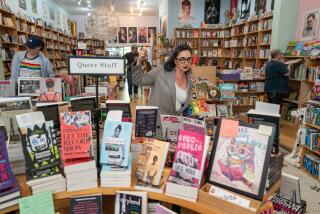A gay Yellow Pages? On my doorstep?
- Share via
I had never wondered whether gay auto mechanics are generally more reliable than heterosexual ones until this week, when the Los Angeles Gay Pages showed up on my doorstep.
The Gay Pages are a kind of Yellow Pages for the gay community, published by the Gay Pages Inc., a company out of Atlanta. None of this was apparent to me when I saw the book lying outside my door and was immediately filled with questions and a vague “Why me?” panic.
Don’t get me wrong, it wasn’t an Ashcroftian panic. It was more a what’s-next-in-this-ever-bifurcating-world-of-ours moment.
Look, I dig the scene out there. I’m West Hollywood-adjacent. I know gay is the new straight, straight is the new bi, and polymorphous perversity, for all of its other attributes, ultimately saves a great deal of time.
But a gay Yellow Pages? At my door?
Just out of curiosity, of course, I explored the book further. Here, in its 264 pages, were accountants, moving companies, veterinarians, home theater systems, pest control services and what seemed an inordinate number of plumbing contractors. I found a few businesses that I patronize -- Le Petit Greek restaurant in Larchmont Village, a bee catcher I once had to call.
I found an ad for the bail bondsman who can be reached at (888) GAY BAIL. “Call me,” the ad said. “Let’s Talk!” Do you have to be in jail? I thought.
The book is anything but comprehensive -- only one barbershop is listed, for instance. On the phone from her office in Atlanta, where the Atlanta Gay Pages have been going for 16 years, co-publisher Marci Alt estimated that 40% of the businesses listed in their first L.A. book are gay-owned or -operated. The pitch is not so much sexual orientation as it is providing a haven from the homophobia supposedly lurking around every other corner out there.
Alt described a business model based on the idea that a gay couple walking into a store isn’t necessarily going to get the same treatment and service as a heterosexual couple. I said this sounded like more of an Atlanta problem than an L.A. one. “I would tend to argue that,” Alt said, pointing out that she grew up in Granada Hills, which isn’t West Hollywood.
I had to admit I’ve never walked into a Granada Hills dry cleaners holding hands with another man. On the other hand, I live in the heart of L.A., where, frankly, between you and me, we currently have a terrible problem in the neighborhood with white people in their 20s and 30s. I don’t know if they’re hetero or not, and I don’t mean to stereotype an entire immigrant group, but these white people, these twenty- and thirtysomethings, they’re rude, and they either don’t work or have weird hours because they work in pictures, and they think they’re so cool with their dogs and their trucker hats, and you can see their underwear, and meanwhile, they’re always on the phone in their big cars and have made it virtually impossible to go to breakfast in the general L.A./ Hollywood/West Hollywood axis.
I found myself telling Alt about the white heterosexual couple ahead of me in line at Canter’s deli counter recently, taking forever to order because they were engaged in more groping than a Schwarzenegger rumor. And all I wanted was some turkey! I said. Didn’t they care?
Alt asked if I would have been more offended had they been two men. I said possibly. She asked if I would have been more offended if they had been two women. I smiled into the phone.
I feared we’d gotten off-topic. Alt said she started the Atlanta Gay Pages after she went into a car dealership there holding hands with her girlfriend and overheard a slur. Over the years, she said, Gay Pages Inc. has branched out into other cities but never for more than a few years, and Alt hopes the Gay Pages will become a permanent fixture in L.A.
There are other such freebie gay directories here, including the Gay & Lesbian Community Yellow Pages, but none to my knowledge that show up on your doorstep with a thunk. Alt said circulation for the inaugural book is 200,000, covering a swath that, of course, targets West Hollywood but also includes Manhattan Beach, Long Beach, Santa Monica and parts of the San Fernando Valley.
Businesses, she said, understand that gay people represent “the strongest financial minority group in America.
“Stereotypically we have two heads of households, no kids. We’re more loyal. If a company comes and does my air conditioning, and I like ‘em, I’m going to tell my friends.”
A house ad in the book itself reads: “They want jobs at gay-friendly companies, a nice house in the suburbs, and an auto mechanic they can trust.... “
Good luck on the auto mechanic. Not that there’s anything wrong with being an auto mechanic.
Paul Brownfield can be reached at [email protected].
More to Read
Sign up for our Book Club newsletter
Get the latest news, events and more from the Los Angeles Times Book Club, and help us get L.A. reading and talking.
You may occasionally receive promotional content from the Los Angeles Times.







